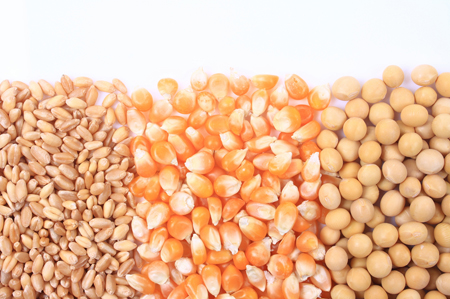PM Markets: Traders Cover Wheat Shorts on Export Hopes
Category: Grains
 (Agrimoney) – Corn and wheat futures extended their rally on sustained short covering, while soybeans showed more modest gains, with no fresh news on export demand.
(Agrimoney) – Corn and wheat futures extended their rally on sustained short covering, while soybeans showed more modest gains, with no fresh news on export demand.
This month’s Wasde, the closely watched supply and demand estimate from the US Department of Agriculture, will hit the markets on Monday.
And traders seem inclined to reel in some of their heavy shorts in cereal, before fresh fundamental news arrives.
“Short covering remains a key feature in the corn and wheat markets, while funds have shifted to adding a relatively small amount of length on the recent recovery,” said Brian Henry, at Benson Quinn Commodities.
Export hopes, and falling sowings
Wheat, particularly hard red winter wheat, is gaining on the idea that it is now highly competitive in world markets.
And attention is now turning to the upcoming US winter wheat campaign, with ideas that plantings are going to be cut sharply, due to the very low prices.
“Anecdotal reports suggest winter wheat acreage will be down big in many areas of Great Plains,” said Tregg Cronin at Halo Commodities.
“We hear more talk of sizeable cut in 2017 US winter wheat area” said Richard Feltes, at RJ O’Brien.
In Kansas City, hard red winter wheat futures finished up 1.5%, at $4.17 ¼ a bushel.
Algeria buys big
The state grain buyer for Algeria the worlds’ third largest grain importer, is reported to have purchased between 300,000 and 400,000 tonnes of optional origin milling quality wheat in a tender.
Although traditionally Algeria usually purchases most of its wheat from France, it is expected that the low crop quality there means that the tender will be filled from other origins, with the US competitive despite the high freight costs.
But in Egypt ergot saga drags on, with stringent quality rules seemingly keeping all available wheat supplies from entering the world’s top exporter.
Markets wait for Egyptian clarity
Trading house Medsofts said it would re-export a 31,000 tonne cargo of Russian wheat that has been stuck in port due to quality rules since July.
On Wednesday it was reported that Roumainian wheat was rejected in its exporting port, but on Thursday the trading house Cerealcom Dolj said it had elected to decline the shipment, due the change in ergot tolerence levels.
“This is obviously becoming a major issue for trading companies on both sides as sellers have zero interest in selling when it could be rejected on a whim, while Egyptian traders are faced with the prospect of an angry populous without any bread.” said Mr Cronin.
But although the short term disruption is bearish, markets are confident that Egypt will have to import wheat sooner or later, in order to meet demand. ”
While Egypt may be trying to brow-beat prices down due to a lack of foreign exchange reserves, it looks as though they will end up paying dearly when they eventually come to the market,” Mr Cronin said.
Short covering
Still, wheat markets are benefitting from technically inspired short covering.
“The technicals in the wheat market have improved to the point that funds have been pushed to cover some shorts in Chicago,” said Mr Henry.
“Price action indicates they are covering these short reluctantly, but the process could continue with inspiration from the other markets,” he added.
December Chicago wheat futures finished up 0.7%, at $4.06 a bushel.
Rain worries help corn higher
Row crops have been taking on a more bullish tone, given the prospect of rains before harvest.
“Late season weather conditions aren’t terrible for the development of corn and soybeans, but the highest potential rain totals certainly aren’t ideal,” said Mr Henry.
December corn futures finished up 1.4%, at $3.38 ½ a bushel.
Lack of export sales holds soybeans back
But markets are long on soybeans, and there were no fresh export sales to spur much buying action.
Soybeans traded lower earlier in the session, before technical strength and support from cereals dragged them higher by the end of the session.
November soybean futures finished up 0.1%, at $9.76 ¾ a bushel.
Robusta rallies for seventh straight session
Robusta futures extended the longest rally in years, although arabica couldn’t hold onto gains.
“Dry weather over the robusta areas in Brazil and following on from a dry weather damaged new robusta coffee crop this year… continue to buoy the markets,” said I&M Smith.
Jack Scoville, at Sucden Financial, said that Brazil “has turned dry again, and there is concern that it is too dry for good flowering”.
“Most producers in the region talk of losses and that trade estimates are overstated,” Mr Scoville said.
“The crop losses are reported due to some extreme drought, then some freezes in coffee areas of B
November robusta coffee finished 0.8%, at $1,927 a tonne, an 18-month high. The contract has now risen for seven straight sessions
November arabica coffee also rose to an 18-month high early in the session, but the contract couldn’t hold onto gains, and fell back to settle down 0.1%, at 154.90 cents a pound.




